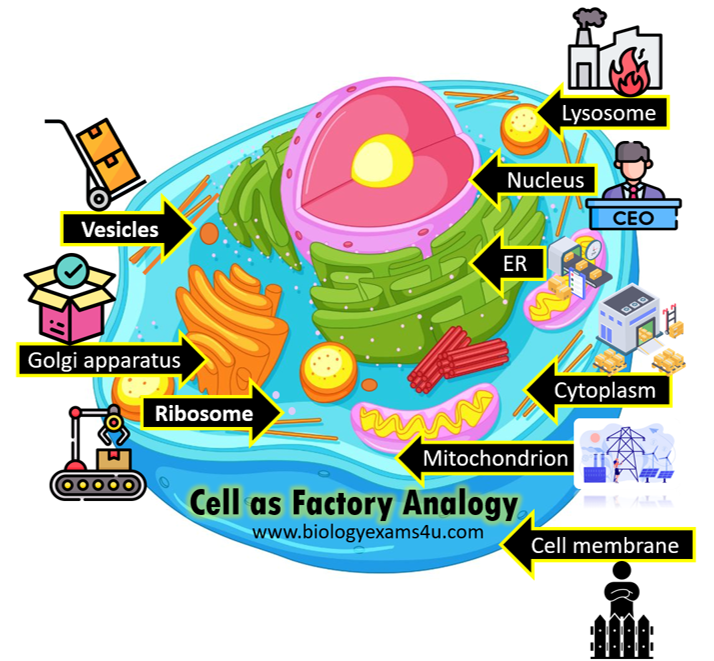Cell Analogy to
factory
Cell is the basic
structural and functional unit of life. The easiest way to understand cell
structure and function is to compare and visualize cell with some familiar
structures like a factory. It's almost liked a mini-factory within our bodies. In
this post, let compare cell structures to factory structures for understanding various
cell structures and their functions.
You can watch our video here.
Nucleus: Nucleus is comparable
to the headquarters or CEOs Office of a factory where CEO along with managers
will decide on products and gives timely instruction for the smooth running of
the factory. Inside cell, nucleus is the
instruction center, where instruction for the synthesis of products or proteins
is coded as DNA. It is protected by a nuclear membrane, ensuring its protection
from the rest of the cell.
Cytoplasm: which is also present
in all types of cells. It can be
compared to the “premise, area or factory floor where everything is happening.
It is the fluid filled matrix of the cell where all organelles, water, salts
and various organic molecules are present.
Ribosomes: are similar to the “machines” in a factory where different products required are made. Ribosomes are protein synthesizing nanomachines, that synthesize proteins required for the cell.
Endoplasmic reticulum: Once the product is
made, it is to be polished and transported for packaging. Here comes the
Endoplasmic reticulum, which is analogous to the "conveyor belt" of a
factory through which products are modified and moved for packing. ER is an
interconnected membranous system where proteins are modified and transported.
Golgi apparatus: is similar to the
‘sorting and packaging center of a factory’ where products are packed and
addressed to reach the correct location. It is the ‘sorting center of the cell’
where proteins are chemically tagged or addressed to reach the correct location
within a cell or to export outside of the cell.
Vesicle is similar to
"factory trolleys," which transport packaged products to various
parts of a factory for shipment. Proteins are packed in vesicles transported to
the precise destinations within the cell or transported outside of the cell.
Lysosome which is comparable
to the factory incinerator, where waste materials are disposed and degraded. A
lysosome is a membrane-bound cell organelle with digestive enzymes that digest
and recycle material taken up from outside the cell and to degrade biomolecules
of the cell itself.
Mitochondrion: can be compared to
the power plant of the factory where electric current is generated and supplied
to different location within the factory for the day to day activities.
Mitochondrion is the power house of the cell producing energy or ATP by
cellular respiration thus providing energy for all cellular activities.
The cell membrane
is analogous to "the guarded gate" of a factory, where credentials
are checked before entry. It is a semi permeable membrane of the cell that has
specialized channels for entry and exit of molecules guarded by proteins. It is
present in all types of cells that is both prokaryotes and eukaryotes.
As plants are
autotrophs or producers, plant cell has another organelle called chloroplast
involved in the synthesize of food or glucose by photosynthesis. It is just
like ‘kitchen’ or canteen in the factory.
In plant cell, apart
from cell membrane there is a rigid outer wall made up of cellulose called cell
wall. It's similar to the factory wall, which is a massive wall that
surrounds the factory.
Finally, in plant
cells, instead of lysosome, there is a big central vacuole with all
digestive enzymes for biomolecule destruction and recycling, similar to a waste
disposal unit or factory incinerator.
Hope you now know the
structure and function of various parts of the cell.
Related post: Cell city Analogy
A great way to thank and support us.
- Visit our TPT store by clicking here.
- Download free resources or purchase worksheets on cell factory analogy.
- Please rate the product and follow us on store.
Thank you so much

